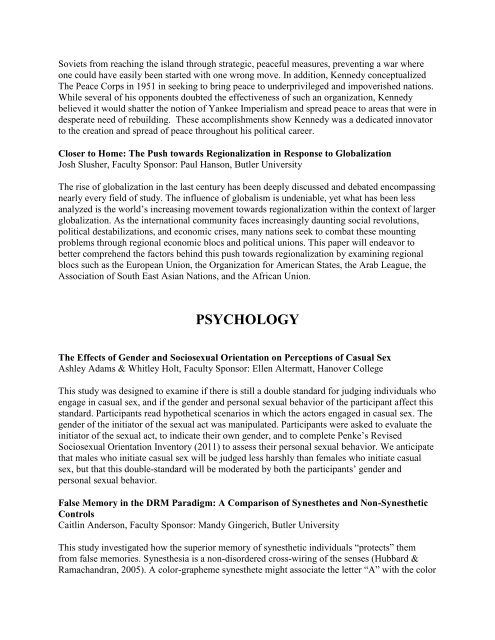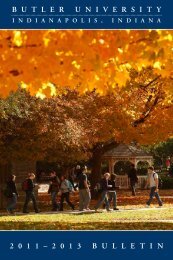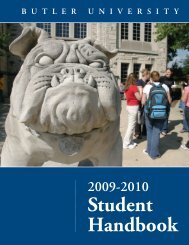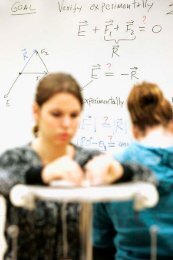Anthropology - Butler University
Anthropology - Butler University
Anthropology - Butler University
You also want an ePaper? Increase the reach of your titles
YUMPU automatically turns print PDFs into web optimized ePapers that Google loves.
Soviets from reaching the island through strategic, peaceful measures, preventing a war where<br />
one could have easily been started with one wrong move. In addition, Kennedy conceptualized<br />
The Peace Corps in 1951 in seeking to bring peace to underprivileged and impoverished nations.<br />
While several of his opponents doubted the effectiveness of such an organization, Kennedy<br />
believed it would shatter the notion of Yankee Imperialism and spread peace to areas that were in<br />
desperate need of rebuilding. These accomplishments show Kennedy was a dedicated innovator<br />
to the creation and spread of peace throughout his political career.<br />
Closer to Home: The Push towards Regionalization in Response to Globalization<br />
Josh Slusher, Faculty Sponsor: Paul Hanson, <strong>Butler</strong> <strong>University</strong><br />
The rise of globalization in the last century has been deeply discussed and debated encompassing<br />
nearly every field of study. The influence of globalism is undeniable, yet what has been less<br />
analyzed is the world’s increasing movement towards regionalization within the context of larger<br />
globalization. As the international community faces increasingly daunting social revolutions,<br />
political destabilizations, and economic crises, many nations seek to combat these mounting<br />
problems through regional economic blocs and political unions. This paper will endeavor to<br />
better comprehend the factors behind this push towards regionalization by examining regional<br />
blocs such as the European Union, the Organization for American States, the Arab League, the<br />
Association of South East Asian Nations, and the African Union.<br />
PSYCHOLOGY<br />
The Effects of Gender and Sociosexual Orientation on Perceptions of Casual Sex<br />
Ashley Adams & Whitley Holt, Faculty Sponsor: Ellen Altermatt, Hanover College<br />
This study was designed to examine if there is still a double standard for judging individuals who<br />
engage in casual sex, and if the gender and personal sexual behavior of the participant affect this<br />
standard. Participants read hypothetical scenarios in which the actors engaged in casual sex. The<br />
gender of the initiator of the sexual act was manipulated. Participants were asked to evaluate the<br />
initiator of the sexual act, to indicate their own gender, and to complete Penke’s Revised<br />
Sociosexual Orientation Inventory (2011) to assess their personal sexual behavior. We anticipate<br />
that males who initiate casual sex will be judged less harshly than females who initiate casual<br />
sex, but that this double-standard will be moderated by both the participants’ gender and<br />
personal sexual behavior.<br />
False Memory in the DRM Paradigm: A Comparison of Synesthetes and Non-Synesthetic<br />
Controls<br />
Caitlin Anderson, Faculty Sponsor: Mandy Gingerich, <strong>Butler</strong> <strong>University</strong><br />
This study investigated how the superior memory of synesthetic individuals “protects” them<br />
from false memories. Synesthesia is a non-disordered cross-wiring of the senses (Hubbard &<br />
Ramachandran, 2005). A color-grapheme synesthete might associate the letter “A” with the color
















